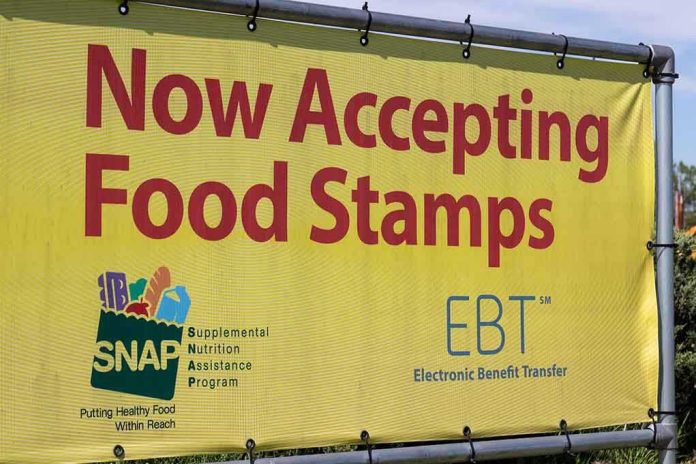
Thirty years on government food aid: a viral confession exposes the consequences of decades-long welfare dependence under failed liberal policies.
Story Snapshot
- A New Mexico woman has gone viral after admitting to 30 years on SNAP benefits, reigniting debate over welfare dependency.
- Trump’s administration is reshaping federal assistance, slashing benefits and enforcing strict eligibility to curb generational reliance.
- Recent legislation targets abuse in social programs and redirects billions from welfare to border security and deportation.
- Conservative critics argue that unchecked handouts and liberal policies have eroded American work ethic and ballooned government spending.
Viral Admission Ignites Welfare Debate
A video from New Mexico featuring Maggie Aragon has exploded online, drawing national attention to the issue of long-term government dependence. Aragon, interviewed on KOAT-TV, revealed she has been receiving SNAP benefits for three decades, sparking outrage and concern among viewers. The segment intended to elicit sympathy instead fueled frustration about welfare abuse and the failure of liberal policies to encourage self-sufficiency.
For many, this case exemplifies a system that traps recipients in generational poverty rather than empowering them to achieve independence.Conservative voices argue that stories like Aragon’s are not outliers but symptoms of a broken safety net that rewards stagnation over initiative. The Trump administration, responding to widespread concerns, has moved quickly to overhaul federal assistance programs, emphasizing accountability and personal responsibility. New laws and executive orders now restrict eligibility for SNAP and other benefits, requiring recipients to meet work requirements and limiting the duration of aid. By prioritizing reforms, leaders seek to end cycles of dependency and restore the values of hard work and self-reliance that built America.
Trump Administration Reforms Target Welfare Abuse
Since taking office in January 2025, President Trump has enacted sweeping changes to federal welfare programs. The “One Big Beautiful Bill Act,” signed into law on July 4, allocates $170 billion not for expanding handouts, but for strengthening immigration enforcement and slashing benefits for lawfully present immigrants. The law removes access to health insurance and nutrition aid for many, including millions of children with immigrant parents, and eliminates key anti-poverty tax credits. By cutting back on federal benefits, the administration aims to address ballooning government spending and redirect funds toward securing the border and protecting American jobs.
Supporters of these reforms argue that previous administrations encouraged dependency and mismanaged taxpayer dollars, resulting in unsustainable deficits and rampant abuse of social programs. The Trump White House now demands strict eligibility checks, mandatory work verification, and periodic audits to ensure only those truly in need receive aid. These measures resonate with Americans frustrated by the excesses of the past, who believe that personal responsibility and limited government are essential for national prosperity.
Welfare Changes Intersect with Immigration Crackdown
Major welfare reforms coincide with aggressive immigration enforcement, as Trump’s second term seeks to overhaul both systems. Project 2025, a conservative blueprint, recommends new laws to shut down the border and expand expedited removal of unlawful immigrants nationwide. The administration has set ambitious deportation targets and expanded detention capacities, with policies that penalize sanctuary jurisdictions and require local police cooperation. By linking welfare eligibility to citizenship and legal status, federal agencies now coordinate data-sharing to prevent undocumented immigrants from accessing social programs and benefits.
These actions have triggered legal challenges and debate over constitutional rights, but supporters maintain they are necessary to restore order and fiscal discipline. Critics argue that harsh measures risk humanitarian crises, but conservative advocates see them as long overdue corrections to years of unchecked government overreach.
Despite political opposition, the administration’s reforms reflect the frustration of millions of Americans who have watched government assistance balloon while traditional values erode. The viral confession of long-term dependence shines a spotlight on the urgent need for change, reinforcing calls to defend conservative principles, promote self-reliance, and secure the nation’s future.
Sources:
Woman on SNAP benefits for 30 years







